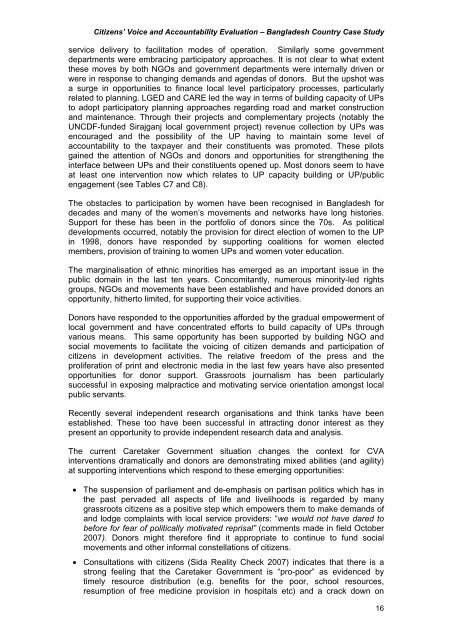Bangladesh - Belgium
Bangladesh - Belgium
Bangladesh - Belgium
You also want an ePaper? Increase the reach of your titles
YUMPU automatically turns print PDFs into web optimized ePapers that Google loves.
Citizens’ Voice and Accountability Evaluation – <strong>Bangladesh</strong> Country Case Study<br />
service delivery to facilitation modes of operation. Similarly some government<br />
departments were embracing participatory approaches. It is not clear to what extent<br />
these moves by both NGOs and government departments were internally driven or<br />
were in response to changing demands and agendas of donors. But the upshot was<br />
a surge in opportunities to finance local level participatory processes, particularly<br />
related to planning. LGED and CARE led the way in terms of building capacity of UPs<br />
to adopt participatory planning approaches regarding road and market construction<br />
and maintenance. Through their projects and complementary projects (notably the<br />
UNCDF-funded Sirajganj local government project) revenue collection by UPs was<br />
encouraged and the possibility of the UP having to maintain some level of<br />
accountability to the taxpayer and their constituents was promoted. These pilots<br />
gained the attention of NGOs and donors and opportunities for strengthening the<br />
interface between UPs and their constituents opened up. Most donors seem to have<br />
at least one intervention now which relates to UP capacity building or UP/public<br />
engagement (see Tables C7 and C8).<br />
The obstacles to participation by women have been recognised in <strong>Bangladesh</strong> for<br />
decades and many of the women’s movements and networks have long histories.<br />
Support for these has been in the portfolio of donors since the 70s. As political<br />
developments occurred, notably the provision for direct election of women to the UP<br />
in 1998, donors have responded by supporting coalitions for women elected<br />
members, provision of training to women UPs and women voter education.<br />
The marginalisation of ethnic minorities has emerged as an important issue in the<br />
public domain in the last ten years. Concomitantly, numerous minority-led rights<br />
groups, NGOs and movements have been established and have provided donors an<br />
opportunity, hitherto limited, for supporting their voice activities.<br />
Donors have responded to the opportunities afforded by the gradual empowerment of<br />
local government and have concentrated efforts to build capacity of UPs through<br />
various means. This same opportunity has been supported by building NGO and<br />
social movements to facilitate the voicing of citizen demands and participation of<br />
citizens in development activities. The relative freedom of the press and the<br />
proliferation of print and electronic media in the last few years have also presented<br />
opportunities for donor support. Grassroots journalism has been particularly<br />
successful in exposing malpractice and motivating service orientation amongst local<br />
public servants.<br />
Recently several independent research organisations and think tanks have been<br />
established. These too have been successful in attracting donor interest as they<br />
present an opportunity to provide independent research data and analysis.<br />
The current Caretaker Government situation changes the context for CVA<br />
interventions dramatically and donors are demonstrating mixed abilities (and agility)<br />
at supporting interventions which respond to these emerging opportunities:<br />
• The suspension of parliament and de-emphasis on partisan politics which has in<br />
the past pervaded all aspects of life and livelihoods is regarded by many<br />
grassroots citizens as a positive step which empowers them to make demands of<br />
and lodge complaints with local service providers: “we would not have dared to<br />
before for fear of politically motivated reprisal” (comments made in field October<br />
2007). Donors might therefore find it appropriate to continue to fund social<br />
movements and other informal constellations of citizens.<br />
• Consultations with citizens (Sida Reality Check 2007) indicates that there is a<br />
strong feeling that the Caretaker Government is “pro-poor” as evidenced by<br />
timely resource distribution (e.g. benefits for the poor, school resources,<br />
resumption of free medicine provision in hospitals etc) and a crack down on<br />
16

















